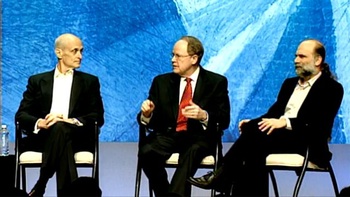
All of the keynote sessions from the RSA Conference on information security are now online as video and audio. Here’s my personal suggestions for the ones to watch.
I didn’t see all of these keynotes. Sometimes there were 17 or 18 sessions running in parallel. I also skipped most of those that were obviously a vendor telling their story. Once I saw a couple of them, I was reminded that for so many IT folks the word “keynote” doesn’t mean something that provides insight any more, but is merely a synonym for “infomercial”.
It’s a shame that RSA hasn’t provided the media in an embeddable form. Or provided an obvious way to link to each keynote directly. Or given the keynote titles. Or told you which ones are panel discussions rather than single-person presentations.
But here’s what I reckon you should watch.
- Wednesday’s panel led by James Lewis, “Cyberwar, Cybersecurity, and the Challenges Ahead”, with former NSA head Mike McConnell, former US Secretary of Homeland Secretary Michael Chertoff and security guru Bruce Schneier.
- The Cryptographers Panel with Dickie George, Whitfield Diffie, Adi Shamir, Martin Hellman and Ronald Rivest. I didn’t see this one myself, but from the comments on Twitter it was a must-see tour through the history of cryptography and an informed look into the future.
- The presentations by US Deputy Secretary of Defence William Lynn and the head of US Cyber Command General Keith Alexander. Lynn’s presentation was a little dry but set out US political views. Alexander was witty and expanded on Lynn’s comments into the practical realm.
- Microsoft’s Scott Charney’s presentation of their “Collaborative Defence” strategy, important because this is the worldview that Microsoft is encouraging us to adopt.
- Michio Kaku, physicist and best-selling author, on “The Next 20 Years: Interacting with Computers, Telecommunication and AI in the Future”. I didn’t see this one, but I’ve seen Kaku on The Colbert Report and he’s a damn good presenter.
- Michael Capuzzo, author of The Murder Room, on forensic pathology. Again, I didn’t catch this one, but was told it was fascinating.
- Bill Clinton’s “Embracing our Common Humanity”. My understanding — although I haven’t checked yet — is that this is essentially the same speech that he gave at Dreamforce in December. That said, he’s a persuasive speaker and it’s worth a listen.
That’s my personal selection, based on what I saw or what I heard about? What are your selections?
[Photo: James Lewis’ keynote panel, “Cyberwar, Cybersecurity, and the Challenges Ahead”. From left to right: former NSA head Mike McConnell; former US Secretary of Homeland Secretary Michael Chertoff; and security guru Bruce Schneier. Disclosure: I travelled to San Francisco to attend the RSA Conference as a guest of Microsoft.]


